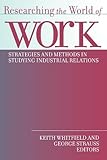Researching the World of Work : Strategies and Methods in Studying Industrial Relations / ed. by George Strauss, Keith Whitfield.
Material type: TextPublisher: Ithaca, NY : Cornell University Press, [2018]Copyright date: ©1998Description: 1 online resource (336 p.) : 3 drawings, 1 tableContent type:
TextPublisher: Ithaca, NY : Cornell University Press, [2018]Copyright date: ©1998Description: 1 online resource (336 p.) : 3 drawings, 1 tableContent type: - 9781501717710
- 331/.07/2
- HD6961.R37 1998
- online - DeGruyter
| Item type | Current library | Call number | URL | Status | Notes | Barcode | |
|---|---|---|---|---|---|---|---|
 eBook
eBook
|
Biblioteca "Angelicum" Pont. Univ. S.Tommaso d'Aquino Nuvola online | online - DeGruyter (Browse shelf(Opens below)) | Online access | Not for loan (Accesso limitato) | Accesso per gli utenti autorizzati / Access for authorized users | (dgr)9781501717710 |
Frontmatter -- Contents -- Preface -- Part I: Some Basic Issues -- Some Basic Issues -- 1. Research Methods In Industrial Relations -- 2. What Is Distinctive About Industrial Relations Research? -- Part II: Strategies And Methods -- Strategies And Methods -- 3. Qualitative Methods: Technique Or Size? -- 4. Quantitative Methods: It's Not What You Do, It's The Way That You Do It -- 5. Experimental Methods -- 6. The Role And Challenge Of Case Study Design In Industrial Relations Research -- 7. In The Eye Of The Beholder: Ethnography In The Study Of Work -- 8. Participatory Action Research: Getting Involved And Creating Surprises At The Workplace -- 9. Large-Scale National Surveys For Mapping, Monitoring, And Theory Development -- 10. Employee Attitude Surveys -- Part III: Comparative Analysis -- Comparative Analysis -- 11. Comparative International Industrial Relations -- 12. Using Workplace Surveys For Comparative Research -- Part IV: Disciplinary Approaches -- Disciplinary Approaches -- 13. Digging Up The Past: Historical Methods In Industrial Relations Research -- 14. Legal Methods: Asking New Questions About Law And The World Of Work -- 15. Sociological Approaches To Employment Research -- Part V: Public Policy -- Public Policy -- 16. Industrial Relations Research And The American Policy-Making Process -- 17. Funders And Research: The Vulnerability Of The Subject -- Part VI: Conclusion -- Conclusion -- 18. Retrospect And Prospect -- References -- Contributors -- Index
restricted access online access with authorization star
http://purl.org/coar/access_right/c_16ec
This book, the first on industrial relations research methods, comes at a time when the field of industrial relations is in flux and research strategy has become more complex and varied. Research that once focused on the relationship between labor and management now involves a wider range of issues. This change has raised a number of key questions about how research should be done.The contributors represent four countries and a range of fields, including economics, sociology, psychology, law, history, and industrial relations. They identify distinctive research strategies and suggest approaches that might be appropriate in the future. Among their concerns are the relative value of qualitative and quantitative methods, of using primary and secondary data, and of single versus multimethod techniques.
Mode of access: Internet via World Wide Web.
In English.
Description based on online resource; title from PDF title page (publisher's Web site, viewed 26. Apr 2024)


